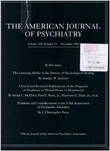Inverse relationship between defensiveness and lifetime prevalence of psychiatric disorder
Abstract
Defensiveness (the tendency not to report unfavorable information about oneself), as measured by the Marlowe-Crowne Social Desirability Scale, has been shown to be inversely correlated with self-reported symptoms. In this family study of depression, direct interviews with 380 subjects combined with relatives' reports revealed a similar inverse relationship between defensiveness and lifetime prevalence of any psychiatric disorder, especially when diagnostic status was most certain and among those at greater risk for psychopathology. The authors conclude that the Marlowe-Crowne scale measures a factor or trait associated with the relative absence of psychiatric disorder, not the underreporting or denial of disorder.
Access content
To read the fulltext, please use one of the options below to sign in or purchase access.- Personal login
- Institutional Login
- Sign in via OpenAthens
- Register for access
-
Please login/register if you wish to pair your device and check access availability.
Not a subscriber?
PsychiatryOnline subscription options offer access to the DSM-5 library, books, journals, CME, and patient resources. This all-in-one virtual library provides psychiatrists and mental health professionals with key resources for diagnosis, treatment, research, and professional development.
Need more help? PsychiatryOnline Customer Service may be reached by emailing [email protected] or by calling 800-368-5777 (in the U.S.) or 703-907-7322 (outside the U.S.).



